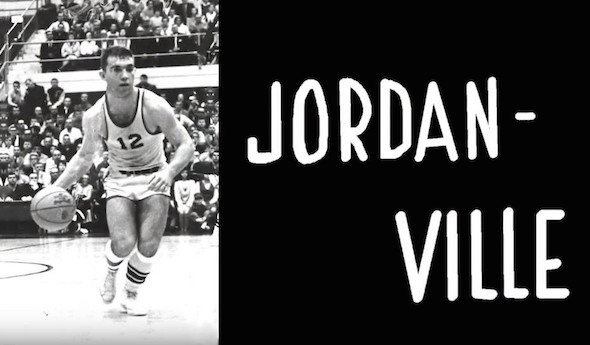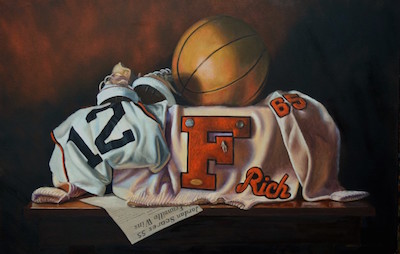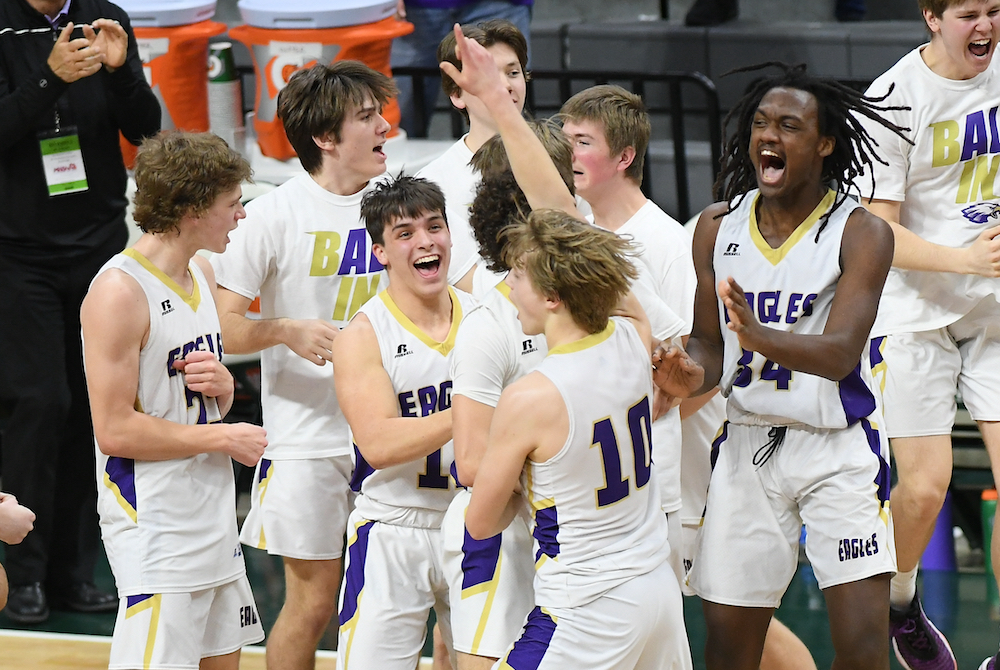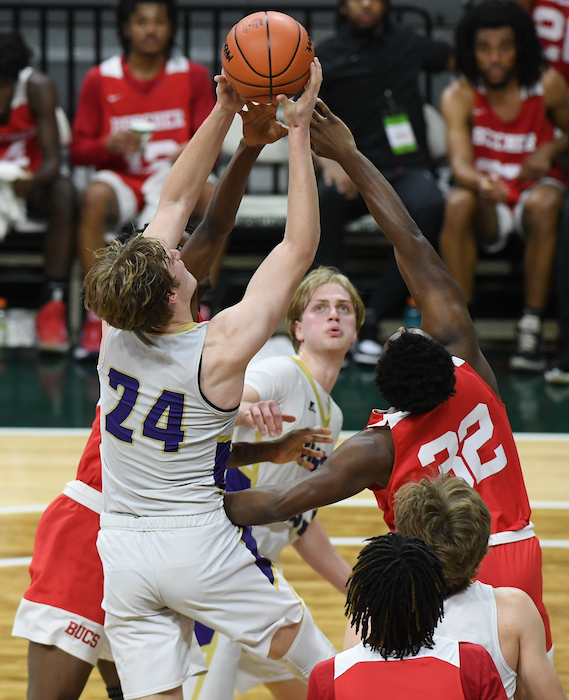
Film Fills In Picture of 'Fennville Flash'
By
Ron Pesch
MHSAA historian
December 28, 2017
We’ve been here before, but not in this way.
The last time was for a retrospective, covering one of the most impressive and awe-inspiring prep careers in Michigan high school history. That time was in print, and included a handful of still images that tried to illustrate the unbelievable.
But this time, the story is in documentary form. It’s woven together from grainy, scratched, faded silent film, a format of capturing memories familiar to thousands of people from generations past, as well as a series of modern-day high-resolution interviews.
Here, the basketball life of the athlete known as the “Fennville Flash” delivers on many levels. Yes, there is a Richie Jordan.
JordanVille, a documentary by John Mooy & Anne Colton, recalls a time when legend spread via word of mouth, newsprint and AM radio.
While it’s hard to comprehend for many today, the exploits of our athletic heroes were formed by “poets in the press box” who sat with pencil and paper, a typewriter, a microphone or a telephone, and described to their audience what they witnessed. On the receiving end, readers and listeners conjured up visualizations based on the facts, phrases and superlatives designed to create an image.
“Traveling left to right on your radio dial” helped listeners feel they were a member of the crowd, seated in the stands, in on the action and a witness to the mayhem. “Packed to the rafters,” reminded fans the importance of what was happening. An exciting game, presented by those with skill, created an event you longed to see. If a broadcast couldn’t be picked up on a transistor or tube radio, the final result might not be known, at the earliest, until the following day’s newspaper arrived.
I’ve told Jordan’s story via the MHSAA before; how he latched on to athletic training, weights and repetition to mold himself into a well-rounded athlete, able to leap to heights unexpected for a kid with a 5-foot-7 frame. The tales of his unfathomable accomplishments slowly leaked beyond the city limits of Fennville into Kalamazoo and greater Southwestern Michigan, then to Detroit. When Detroit Free Press writer Hal Schram relayed Jordan’s feats, the secret traveled across the state and beyond its drawn borders.
From there the legend of Jordan’s accomplishments grew. In Fennville, as in many small towns across the country, the city shut down when a game was played. The Jordan story was so enticing that thousands would travel vast distances to see him play with their own eyes. Today, his single season scoring average of 44.4 points per game during the 1964-65 campaign still remains the top mark in the MHSAA record book.
 JordanVille runs just shy of a half hour. Contained within is insight into the athlete that is challenging to relay in print form. Thanks to access to home movies and a series of interviews with Jordan, former teammates, past opponents and his high school coach, the determination, dedication and drive of a kid who wouldn’t let physical size be a deterrent from achievement radiates from the screen. On display is small town America at its finest, and perspective formed over 50+ years.
JordanVille runs just shy of a half hour. Contained within is insight into the athlete that is challenging to relay in print form. Thanks to access to home movies and a series of interviews with Jordan, former teammates, past opponents and his high school coach, the determination, dedication and drive of a kid who wouldn’t let physical size be a deterrent from achievement radiates from the screen. On display is small town America at its finest, and perspective formed over 50+ years.
For Mooy, it completes a filmmaking journey started six years ago. But the story of Jordan, in his eyes, date back to his school days. Mooy first heard about Jordan as a 7th-grader from a math teacher. A second-team all-St. Joseph Valley League selection, Mooy played at Marcellus High School and scrimmaged against Jordan and the Fennville Blackhawks.
He couldn’t believe his eyes.
“Everyone wanted to see this kid play,” said Mooy in 2011. “He was the first high school player I saw sign an autograph.
Today, with the interviews complete, and the film ready for viewing, Mooy sees more than just a sports story:
“With the benefit of years now passed, I look at the Rich Jordan story with a new respect. JordanVille created a place that was welcoming no matter who you were, or what color your skin happened to be. It was the 1960s. Rich was growing up Jewish, the Civil Rights Movement was in full swing, and the Vietnam War was on everyone's mind. And in Fennville, Michigan, from 1961 to 1965, the Jordan high school years, there were lessons beyond sports being learned by everyone that would last a lifetime. The Jordan household, under the guidance of (his parents) Tuffy and Sylvia Jordan, is where the story begins."
The film speaks of a time that has departed. Competition for our attention was less focused; phones hung on walls or sat on tabletops, communities were tighter, the training table featured peanut butter and chocolate milk instead of protein powder. A city could easily be renamed for a day.
The film also reminds us that those days were far from perfect.
If all goes as planned, the public will see the finished product come the flip of the calendar. In West Michigan, JordanVille is scheduled to show on New Year’s Day at 6 p.m. on WGVU, and will repeat on WGVU-Life at 7:30 p.m., Friday, Jan. 5.
Seek it out, and spread the word, just like in days of old.
 Ron Pesch has taken an active role in researching the history of MHSAA events since 1985 and began writing for MHSAA Finals programs in 1986, adding additional features and "flashbacks" in 1992. He inherited the title of MHSAA historian from the late Dick Kishpaugh following the 1993-94 school year, and resides in Muskegon. Contact him at [email protected] with ideas for historical articles.
Ron Pesch has taken an active role in researching the history of MHSAA events since 1985 and began writing for MHSAA Finals programs in 1986, adding additional features and "flashbacks" in 1992. He inherited the title of MHSAA historian from the late Dick Kishpaugh following the 1993-94 school year, and resides in Muskegon. Contact him at [email protected] with ideas for historical articles.
PHOTOS: (Top) Richie Jordan runs Fennville's offense during his thrilling high school career in the 1960s. (Middle) Jordan memorabilia, as captured by Bill Williams.

In Semifinal Return, Schoolcraft Dethrones Reigning Champ to Take Next Step
By
Keith Dunlap
Special for MHSAA.com
March 24, 2022
EAST LANSING – There are many teams around the state that probably figured no recipe existed for dominating Flint Beecher in a boys basketball game.
They likely were taking notes Thursday while watching what Schoolcraft accomplished in the second Division 3 Semifinal at Michigan State University’s Breslin Center.
Playing just about flawlessly on offense and defense, Schoolcraft advanced to its first Finals championship game since winning the Class C title in 2011 with a stunning 55-39 win over the reigning Division 3 champion.
“Five weeks ago, we just kind of overhauled our offense,” Schoolcraft coach Randy Small said. “We tried to play more inside-out and have more post-up action than what we had previously. I think that has helped us out overall offensively. It’s just given us more flow.”
 It was a return trip to the Semifinals for the Golden Eagles, who fell 54-50 in overtime to Iron Mountain last year at Breslin.
It was a return trip to the Semifinals for the Golden Eagles, who fell 54-50 in overtime to Iron Mountain last year at Breslin.
The simplest explanation for what happened this time is that Schoolcraft (24-2) made its shots throughout – with an especially notable showing from 3-point range – while Beecher (22-3) did not find similar success.
Schoolcraft shot 9 of 12 from 3-point range and made 17 of 27 shots from the field overall, while Beecher made 5 of 19 shots from 3-point range and 15 of 46 overall.
But going a bit deeper, much of the credit for Schoolcraft’s shooting has to go to the way it handled any pressure Beecher threw at it, effectively creating a halfcourt game and patiently moving the ball on offense for good shots.
Schoolcraft turned the ball over a reasonable 12 times and rarely let Beecher speed the game up.
“I think the whole team handled it pretty well,” senior Ty Rykse said of Beecher’s pressure. “We knew they were going to pressure. The past couple of days, we had just been stressing to handle the ball pressure and I think we did.”
Defensively, Schoolcraft used its height advantage inside, employing a zone defense to pack in Beecher and force the Buccaneers to win from the perimeter.
“I just thought we did a pretty good job of controlling the paint and keeping them out of the paint,” Small said. “We had to give up some threes because they are quicker than we are. We didn’t want to spread ourselves too thin. I thought overall, we did a pretty good job of that.”
Schoolcraft made five of its first six shots from 3-point range in the first half and took a 28-17 lead into halftime.
The third quarter saw Schoolcraft continue to make it a halfcourt contest and shoot well from the outside. Schoolcraft grew its lead to 17 points at 41-24 with 55 seconds remaining in the third following a 3-pointer by junior Eli DeVisser.
A Beecher run never materialized, and the lead increased to 49-27 with 5:36 remaining and was never threatened the rest of the game.
“We had shots we missed; they had shots they made,” said first-year Beecher coach Marquise Gray. “I think we took some good, quality shots. You’ve got to give them credit.”
Sophomore Shane Rykse scored 21 points, senior Tyler DeGroote scored 13 and Ty Rykse added 12 points for Schoolcraft.
Senior Carmelo Harris scored 15 points and junior Robert Lee added 10 for Beecher.
PHOTOS (Top) Schoolcraft celebrates its Semifinal win Thursday afternoon at Breslin Center. (Middle) The Golden Eagles’ Tyler DeGroote (24) and Beecher’s Bryce Carr (32) reach for a loose ball. (Click for more from Hockey Weekly Action Photos.)

